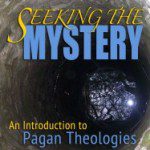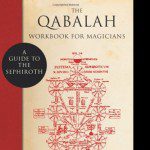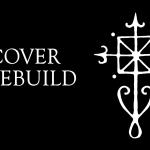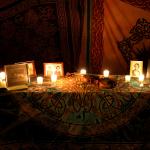Today I’m giving a shout out for Christine Hoff Kraemer, who is very active here at Patheos, and does a vast amount of making things go for the Pagan columns. You may have gathered by now that she has also written a book – Seeking the Mystery: An Introduction to Pagan Theologies – and there’s more about it here.
Being a Druid, I’m a non-dogmatic sort of soul. Nothing winds me up like being micromanaged or told exactly how to do things. I detest being told what I *should* believe or feel. I hate authoritarian approaches to spirituality.
What I love are tools. I love books and teachers that give me frameworks to hang my own ideas from, or who offer me a map and encourage me to go and explore. I like broad, flexible ideas I can adapt to fit my own ways of living and being. I don’t want to be led, I want to be inspired!
The subtitle for Christine’s book is An Introduction to Pagan Theologies. “Theology” is a word we tend to associate with Christianity, but it is available to everyone. Christine explains what theology is, and how it is accessible to Pagans: not just academic, ivory tower Pagans, but anyone who feels inclined to put in the time and effort.
The book is a lovely mix of things. It does give a broad overview of the general state of theology in modern Paganism – very useful for anyone on the outside, trying to make sense of us. It gives some really good DIY tools to get a person thinking and exploring on their own. It also conveys a sense of how we could grow and develop as a community, how young we are in our traditions and how much scope we have to be more than we currently are. I find that really exciting.
Without giving too much away, there is also the best explanation of Pagan ethics I have ever read. Christine draws on Brendan Myers inspired work The Other Side of Virtue and Emma Restall Orr’s massively influential Living with Honour, and brings in her own understandings to create something that is punchy, easy to utilise, and that really does express how Pagans, in the absence of holy books and long lists of rules, can actually be very ethical people. I am hoping that the term she uses, “virtue ethics,” becomes commonplace. It is well worth taking the time to pick up the book and find out more. It is inspiring, non-dogmatic, and bloody useful!
I’m a regular book reviewer for www.druidnetwork.org, and I tend to post to GoodReads and such, as well as on my personal blog, www.druidlife.wordpress.com. If I really like a book, I’ll often ask the author to write me a guest post or do an interview with me. I believe in praising the good stuff, and I want there to be more excellent, inspiring books (and other forms of creativity) in the world. If I am sent something and don’t like it, I tend not to comment – why draw attention? Promoting the good stuff and supporting creative people is very much part of my work as a Druid. So, if you think I’d like something you have made, let me know.
Druid Thoughts is published on occasional Wednesdays on Agora. Follow it via RSS or e-mail!

















